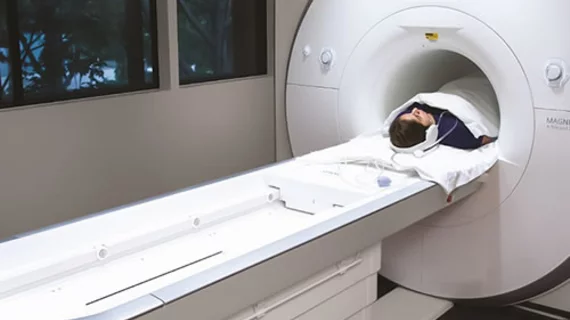Could cardiac MRI become the reference standard for diagnosing heart failure?
Cardiac MRI may offer a more accurate and less invasive method for diagnosing heart failure, a new study published in the European Heart Journal shows.
The research focused on the findings of 835 patients who underwent both right heart catheterization (RHC) and cardiovascular magnetic resonance (CMR) imaging within a 24-hour period. These exams were also compared to a validation cohort of patients who completed transthoracic echocardiography (TTE) exams to assess heart failure. Based on the comparisons, authors of the study revealed that nearly 71% of patients who had inaccurate pressure measurements using TTE had correct measurements on their heart MRI scans.
“We investigated if heart MRI can predict invasively measured left ventricular filling pressure,” lead researcher Dr. Pankaj Garg, from UEA’s Norwich Medical School, and co-authors said. “Once we had identified the key parameters—left atrial volume and left ventricular mass—we created an equation to non-invasively derive the pressure in the heart.
Cardiac MRI is seen as a promising tool to assess heart failure as it is less invasive than the current diagnostic standard of heart catheterization, which has increased risks for patients. While echocardiography fills the need for a minimally invasive imaging option, the authors of the study note that it yields inaccurate results in up to 50% of cases.
A key finding of the study was that CMR modelled pulmonary capillary wedge pressure (PCWP), which was used as the reference for left ventricular filling pressure (LFVP), yielded accurate measurements in 71% of cases. That’s compared to 25% accuracy using echocardiography. Additionally, CMR results were non-inferior in comparison to those observed in the catheterization exams and the experts concluded that the measurements could be used to predict survival.
“These findings will reduce the need for invasive assessment. This is not only cost-effective but also reduces risks to patients, as a heart MRI scan is a completely non-invasive test,” Garg said.
The authors noted that their methods can be implemented in any facility that conducts cardiac MRIs.
The detailed research, Cardiac magnetic resonance identifies raised left ventricular filling pressure: prognostic implications, can be viewed in the European Heart Journal.
Related cardiac imaging content:
New cardiac MRI analysis offers updated insight into long-term impact of vaccine-related myocarditis
Study urges radiologists to report CAC findings on all chest CTs, regardless of clinical indication
Risks of stroke and heart attack increase with larger thoracic aortic diameter, research shows

